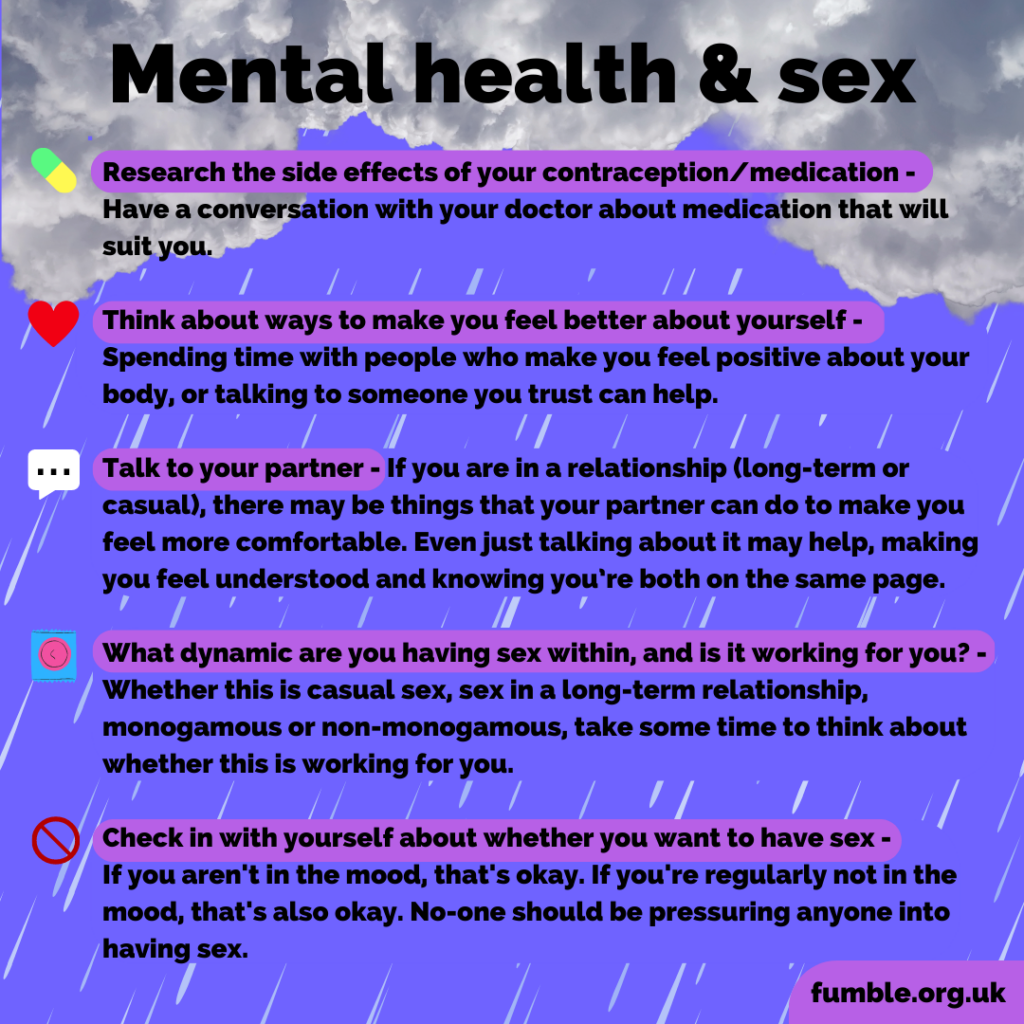Types of antidepressants and your sex drive
The world of antidepressants can feel daunting, but hopefully this beginner guide will make things a little clearer
Antidepressants are a form of medication that are primarily used to treat depression, but can also be used to help treat anxiety, bulimia, OCD, PTSD and many other conditions. They are prescribed by a doctor, and can be an effective means of treating mental illness (often in combination with other treatments, like counselling and therapy).
There are 27 different antidepressants licensed for prescription in the UK, which can mostly be broken down into 4 categories:
🧠 SSRIs
🧠 SNRIs
🧠 Tricyclics
🧠 MAOIs
These abbreviations come from how the medication works. It’s important to remember that many medications have side effects, and everyone reacts to these differently. Some people experience several side effects, and others experience none.

So what do they stand for and what is it they do they do exactly?
Selective Seraton Reuptake Inhibitors (SSRIs)
Serotonin is a neurotransmitter – a chemical that allows messages to be delivered around the brain. It helps to regulate mood, libido, sleep, memory and some social behaviour, and it gets released by nerve cells. A lack of serotonin is believed to negatively impact these areas, while generally higher levels of serotonin can improve your mood.
As the most commonly prescribed antidepressant in the UK, Selective Serotonin Reuptake Inhibitors (SSRIs) work by stopping the serotonin from being reabsorbed by the brain. This makes it more readily available and helps the ‘good’ mood last longer. Typically prescribed for six months at a time, they can take at least a couple of weeks to a month to kick in, with some mild side effects.
Serotonin and Noradrenaline Reuptake Inhibitors (SNRIs)
Serotonin and Noradrenaline Reuptake Inhibitors (SNRIs) work very similarly to SSRIs, and can be used to treat more severe depression/anxiety. They act on both serotonin and noradrenaline (a stress hormone and neurotransmitter). Their action is selective, allowing them to target brain chemicals affecting mood with less side effects. Some people respond better to SSRIs and some respond better to SNRIs.
Tricyclics (TCAs)
Sometimes shortened to TCAs, tricyclic antidepressants work by prolonging serotonin and noradrenaline in the brain. They are an older type of antidepressant that can have more unpleasant side effects in comparison with SSRIs and SNRIs. Today, they’re not usually recommended as the first treatment for depression, but they are sometimes prescribed for people with severe depression who aren’t responding to other treatments.
Monoamine Oxidase Inhibitors (MAOIs)
Monoamine Oxidase Inhibitors (MAOIs) make it more difficult for noradrenaline and serotonin to be broken down. The main aim is the same as the other types of antidepressant – keeping key chemicals available and working in the brain so you can feel the positive effects!
This is another older, rarely used, type of antidepressant. They’re often a final option, prescribed after having tried all others, because they can interact with some food types. Taking them means a strict diet needs to be followed, which is not the case with other kinds of antidepressants.
Having sex on antidepressants
Being aware of how the medication is impacting you means that if anything feels wrong or is worrying you, then you can (and should) go back to the doctor and make a change. A common reality is that some antidepressants, such as SSRIs, can deplete your sex drive. They can also affect your ability to orgasm, time taken to orgasm and, for people with penises, to stay erect during sex.
This is because of the change in dopamine levels that some conditions, and the antidepressants, cause in the brain. But this varies a lot on your metabolism, and you may not experience any side effects at all. Then again, SNRIs have shown less of an effect on sexual arousal, but may not be quite right for some people.

Don’t let the idea of side effects put you off trying something that could absolutely change your life for the better. And, given how you’ve been feeling, you may not have been feeling up to sex much anyway. It’s important that you talk to a medical professional before changing or stopping any medication, as there can be withdrawal difficulties.
I think I may need antidepressants
Well done for doing your research and being proactive in looking after yourself! If you feel that you might benefit from taking an antidepressant, it’s nothing to be ashamed of. For many people, a combination of medication and lifestyle changes make a world of difference.
Your next steps
👩⚕️ Talk to a professional. Your GP is a good starting point, but you could also speak to a counsellor, school nurse or walk in centre for advice.
💊 Remember that meds aren’t an instant fix and they don’t all work equally well for everyone.
🗣️ Consider and discuss alternative options. For example, cognitive behaviour therapy (CBT).
💡 Remember: it may take time and dosage changes to find the best fit. Don’t be disheartened if you don’t see an immediate effect!
And remember, the more honest you are about your experience, the safer and better your change will be.
Other support
- Understanding depression and where to go for help
- Need help? Top ten mental health support groups
- NHS – Antidepressants
- YoungMinds – Medication guides
Read more
Last Reviewed 09 August 2023
Image Credit: Alena Shekhovtcova via Pexels





